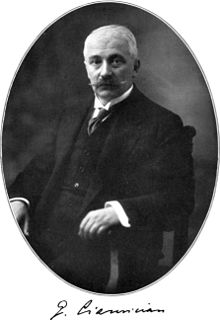Giacomo Luigi Ciamician
| Giacomo Luigi Ciamician | |
|---|---|
 |
|
| Born |
29 August 1857 Trieste, Austrian Empire |
| Died | 2 January 1922 (aged 64) Bologna, Italy |
| Education | University of Vienna |
| Employer | University of Bologna |
| Known for | |
| Parent(s) | Giacomo Ciamician Carolina Ghezzo |
Giacomo Luigi Ciamician (Armenian: Հակոբ (Ջակոմո) Լուիջի Չամիչյան, 27 August 1857 – 2 January 1922) was an Italian photochemist and senator of Armenian descent.
Ciamician was born in Trieste, Italy (then part of Austria) from Armenian parents.
Ciamician was an early researcher in the area of , where from 1900 to 1914 he published 40 notes, and nine memoirs.He received his Ph.D. from the University of Giessen. His first experiment was published in 1886 and was titled "On the conversion of quinone into quinol.
In 1912 he presented a paper before the 8th International Congress on Applied Chemistry later also published in Science in which he described the world's need for an energy transition to renewable energy. Ciamician saw the possibility to use photochemical devices that utilizing solar energy to produce fuels to power the human civilization and called for their development. They would not only make humanity independent from coal, but could also rebalance the economic gap between rich and poor countries. His vision makes him one early proponents of artificial photosynthesis.:
"On the arid lands there will spring up industrial colonies without smoke and without smokestacks; forests of glass tubes will extend over the plains and glass buildings will rise everywhere; inside of these will take place the photochemical processes that hitherto have been the guarded secret of the plants, but that will have been mastered by human industry which will know how to make them bear even more abundant fruit than nature, for nature is not in a hurry and mankind is. And if in a distant future the supply of coal becomes completely exhausted, civilization will not be checked by that, for life and civilization will continue as long as the sun shines!'"'
Ciamician received the honorary Doctor of Laws (DLL) from the University of Glasgow in June 1901.
...
Wikipedia
